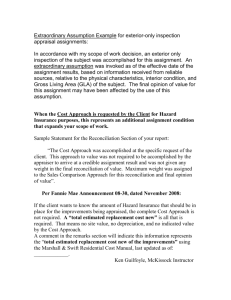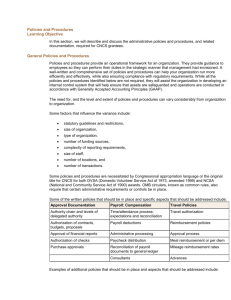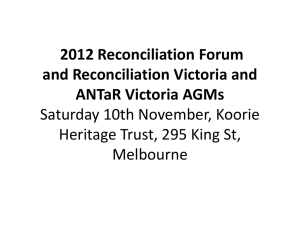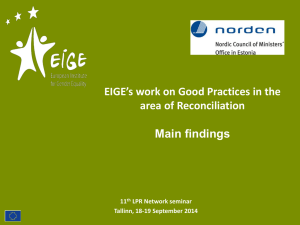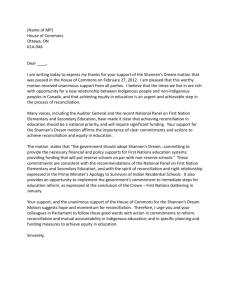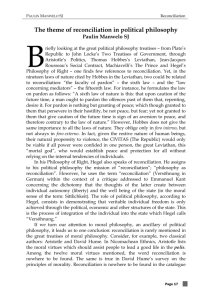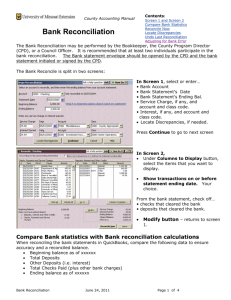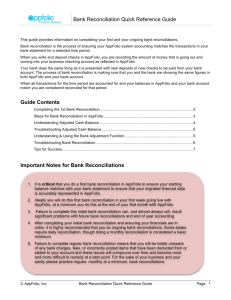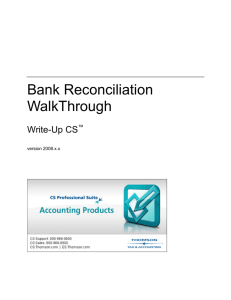ROLE OF RELIGION IN NATION BUILDING
advertisement
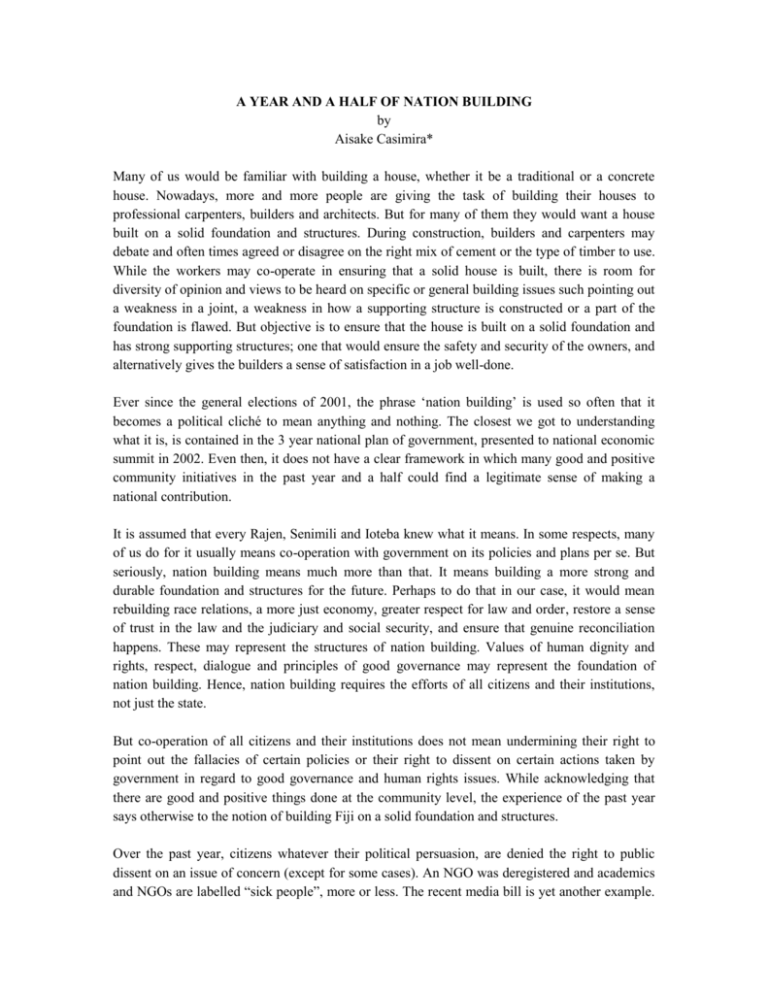
A YEAR AND A HALF OF NATION BUILDING by Aisake Casimira* Many of us would be familiar with building a house, whether it be a traditional or a concrete house. Nowadays, more and more people are giving the task of building their houses to professional carpenters, builders and architects. But for many of them they would want a house built on a solid foundation and structures. During construction, builders and carpenters may debate and often times agreed or disagree on the right mix of cement or the type of timber to use. While the workers may co-operate in ensuring that a solid house is built, there is room for diversity of opinion and views to be heard on specific or general building issues such pointing out a weakness in a joint, a weakness in how a supporting structure is constructed or a part of the foundation is flawed. But objective is to ensure that the house is built on a solid foundation and has strong supporting structures; one that would ensure the safety and security of the owners, and alternatively gives the builders a sense of satisfaction in a job well-done. Ever since the general elections of 2001, the phrase ‘nation building’ is used so often that it becomes a political cliché to mean anything and nothing. The closest we got to understanding what it is, is contained in the 3 year national plan of government, presented to national economic summit in 2002. Even then, it does not have a clear framework in which many good and positive community initiatives in the past year and a half could find a legitimate sense of making a national contribution. It is assumed that every Rajen, Senimili and Ioteba knew what it means. In some respects, many of us do for it usually means co-operation with government on its policies and plans per se. But seriously, nation building means much more than that. It means building a more strong and durable foundation and structures for the future. Perhaps to do that in our case, it would mean rebuilding race relations, a more just economy, greater respect for law and order, restore a sense of trust in the law and the judiciary and social security, and ensure that genuine reconciliation happens. These may represent the structures of nation building. Values of human dignity and rights, respect, dialogue and principles of good governance may represent the foundation of nation building. Hence, nation building requires the efforts of all citizens and their institutions, not just the state. But co-operation of all citizens and their institutions does not mean undermining their right to point out the fallacies of certain policies or their right to dissent on certain actions taken by government in regard to good governance and human rights issues. While acknowledging that there are good and positive things done at the community level, the experience of the past year says otherwise to the notion of building Fiji on a solid foundation and structures. Over the past year, citizens whatever their political persuasion, are denied the right to public dissent on an issue of concern (except for some cases). An NGO was deregistered and academics and NGOs are labelled “sick people”, more or less. The recent media bill is yet another example. While it may be true that the level and quality of journalism needs to improve, it does not warrant a blanket legislation to cover everything else about the media. As a measure to rebuild the economy, polices that heavily favoured investment and economic growth were put in place with undue regard to the experiences of other third world countries, which show that poverty increase usually accompany such policies. Achieving better race relations are hampered by affirmative action policies that mainly targeted one ethnic group when recent studies by Professor Subramani and the Asian Development Bank show that poverty is not racial but across the board. Moreover, achieving true reconciliation is even harder when its underpinnings exclude other ethnic and religious groups. Restoring respect for law and order is further hampered by political influence as the recent examples of the President’s Office efforts to influence the military to go easy on those implicate in the 2000 coup and the demand of the CMV party for the release of George Speight show. We cannot escape the fact that if we are going to articulate a common vision for nation building, we need to recognise and acknowledge the diversity of views on nation building and to create space for these to be heard. At the same time, we need to recognise that our objective - building a nation on a solid foundation and structures – need to be framed by agreed values and principles. Can we compromise justice in our pursuit of genuine reconciliation? Can we implement economic policies that international experiences show increase/worsen the level of poverty and widens the gap between the rich and the poor or undermine workers’ rights? Can we honestly hope to better our race relations if many are denied affirmative action because of their race? Can we hope to achieve true reconciliation when the official policy seems to exclude other ethnic and religious groups in the process? Can we rebuild a sense of greater respect to the law and the judiciary when the law seems to be preferentially applied? We have a constitution but without a national consensus on some of its fundamentals, can we hope to build structures that are durable? But perhaps the basic principle in our pursuit of nation building is whether it goes hand in hand with promoting the dignity of all citizens and their rights. We should not lose sight of the fact that nation building involves two important dimensions cooperation and social criticism. These must be guaranteed their place in the process of nation building. If we only allow space for co-operation and not for social criticism, we run the risk of nullifying the rights and roles of citizens to dissent on legitimate issues of concern. For example, if in co-operating, the government colludes with and fully funds the activities of the Christian Churches, the latter’s ability to critique national policies and issues such as corruption and discrimination would be seriously eroded. This poses a serious problem because if the Churches (and religion in general) are silent on such issues, who else has the moral authority to do so? The government cannot and must not assume to be the moral conscience of the nation, nor should it pretend to provide all the answers to human needs. A government that supports cooperation at one level but silences social criticism at another reflects intolerance and may lead to totalitarianism. Conversely, social criticism without cooperation is equally harmful and may lead to extremism, whether it is racial or religious. In these 2 times, Fiji needs to stress both dimensions especially on questions of law and order, equality and human rights, reconciliation, economic recovery, corruption and accountability of the government, and political leadership. The point here is that while we should truly co-operate, we should not lose sight of the need to see that the fundamentals of nation building are strong and solid. Situations where people and their institutions come to co-operate or to take a public stand on an issue reveal something of the values that are common to all. The love and justice of God is seen in our seeking to understand each other, in our working together on certain issues to achieve a common goal and in our stand on moral principles when some political initiatives are judged to be harmful to our people. We cannot build the nation on a situation of increasing poverty, on policies that discriminate others, or at the expense of justice and truth in reconciliation. If the fundamentals are false, the structures we build may be feeble and weak to withstand another national disaster. * Aisake Casimira is the Director of the Ecumenical Centre for Research, Education and Advocacy or ECREA 3
